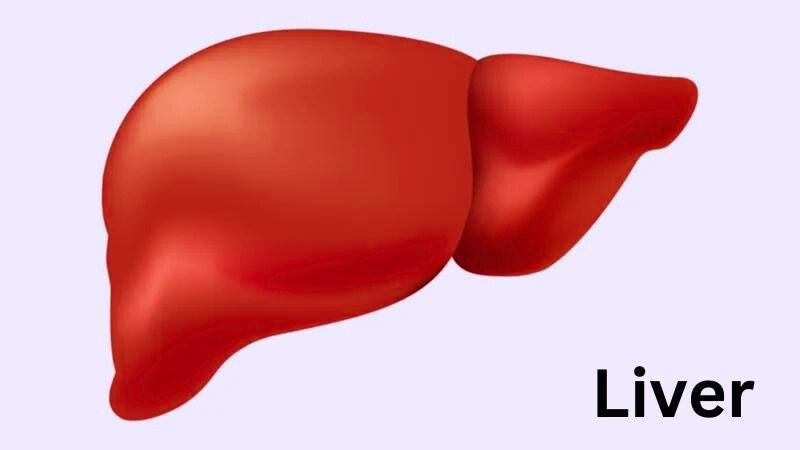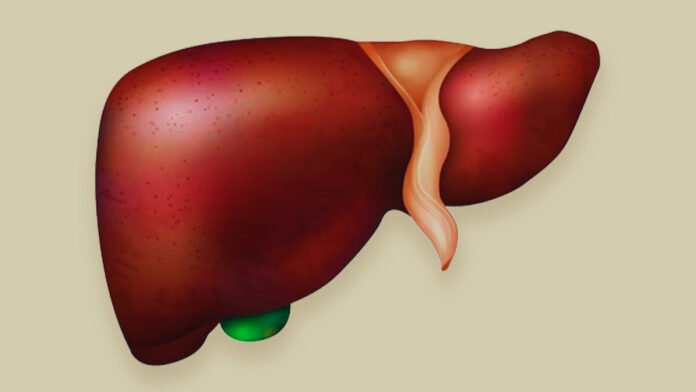Introduction:
One of the body’s most important organs, the liver is involved in many physiological functions, such as digestion, metabolism, and detoxification. Regretfully, it is vulnerable to a number of factors that may affect how well it works. This article will examine the signs and symptoms of liver issues as well as practical solutions.

Understanding liver problems
Liver difficulties are caused by a variety of disorders that impact this important organ. Hepatitis and alcoholic liver disease are two examples of illnesses that can present with a variety of symptoms, many of which point to an underlying problem with liver function.
Common symptoms of liver problems
- Slight jaundice the yellowing of the skin and eyes, or jaundice, is a typical indicator of liver disease. It happens when bilirubin accumulates in the body because to the liver’s inability to handle it.
- Pain in the Abdomen, Abdominal discomfort or pain may indicate liver problems. It is necessary to seek medical assistance whether this discomfort is mild and continuous or acute and sporadic.
- Color Shifts in the Urine and Stool Urine and stool colors might change as a result of liver issues. Pale-colored feces and dark urine might be signs of problems with bile excretion and production.
Less common symptoms
- Weary one less evident but yet important indicator of liver disease is unexplained weariness. Reduced function of the liver might impact one’s energy levels.
- Unexpected weight reduction Unexpected and abrupt weight loss may be a sign of liver disease or a disturbance in metabolic pathways.
- Abdomen edema an buildup of fluid in the belly resulting in edema might be caused by liver issues. Ascites is a disorder that has to be treated right away.
Diagnosing liver problems
Effective treatment of liver disorders depends on early identification. To identify the underlying problem, doctors may perform a physical examination, order blood tests to evaluate liver function, or use imaging studies like MRIs or ultrasounds.
A variety of procedures are used to diagnose liver issues, such as blood tests to evaluate liver function and enzymes, MRIs and ultrasounds, and occasionally liver biopsies for a more thorough tissue study. Abdominal discomfort, edema, or jaundice are examples of symptoms that may call for more testing. For liver disorders to be effectively treated and managed, early identification is essential.
Causes of liver problems
In order to properly treat liver issues, it is essential to comprehend their causes. Frequent offenders include non-alcoholic fatty liver disease (NAFLD), viral hepatitis infections, and excessive alcohol usage.
Treatment Options
- Modifications in lifestyle usually, the first line of defense is to adopt a healthy lifestyle. This include drinking in moderation, eating a balanced diet, and getting frequent exercise.
- Drugs to treat symptoms and enhance liver function, doctors may prescribe drugs, depending on the particular liver issue.
- Surgical Procedures to restore normal liver function in extreme circumstances, surgical procedures including liver transplants may be taken into consideration.
Managing liver problems through diet
A diet that is well-balanced is essential for maintaining liver health. Overall health may be enhanced by limiting high-fat diets and increasing liver-friendly choices such as fruits, vegetables, and whole grains.
Preventing liver problems
Taking preventative action can lower the chance of liver issues. These include of choosing a healthy lifestyle, receiving a hepatitis vaccination, and setting up routine check-ups with the doctor to ensure early detection.
Maintaining a healthy lifestyle is key to preventing liver issues. This includes avoiding hazardous behaviors like sharing needles, limiting alcohol intake, receiving a hepatitis vaccination, keeping a healthy weight through diet and exercise, and avoiding exposure to pollutants and dangerous substances. Frequent examinations and screenings can also aid in the early detection of liver problems.
Impact of liver problems on mental health
Mental health might suffer as a result of liver issues. Patients could feel depressed, anxious, or stressed. These difficulties might be lessened by putting in place a support network and getting expert assistance.
Mental health can be greatly impacted by liver issues. Anxiety, despair, cognitive decline, and even psychosis are among the symptoms of conditions such as liver disease and liver failure. This is caused by a number of things, including the liver’s involvement in hormone regulation, drug metabolism, and toxin processing—all of which can have an impact on brain function. Mental health issues can also be exacerbated by the anxiety and stress of managing a major medical illness.
Living with liver problems
Developing coping mechanisms to improve quality of life is part of managing liver disease. Online and off, support groups offer invaluable guidance and a platform for exchanging experiences.
Dietary adjustments, medication management, routine medical monitoring, and abstaining from alcohol and certain drugs are all necessary when dealing with liver issues. Modifying one’s lifestyle to include regular exercise and weight control is also essential for preserving liver health. People with liver problems can live far better lives when they have the support of family, friends, and medical experts.
Innovations in liver disease treatment
There is hope for better liver disease treatments because to continuous research and advancements in medical technology. The treatment of liver disease is changing, with new surgical methods and state-of-the-art drugs.
Advances in non-invasive diagnostics, such as fibroscan and MRI elastography for the early diagnosis of liver fibrosis and cirrhosis, are among the recent developments in the treatment of liver disease. Furthermore, the discovery of direct-acting antiviral medications has completely changed the way hepatitis C is treated, resulting in faster recovery times and greater percentages of cure. Treatment options for hereditary liver illnesses appear promising because to novel therapeutics including gene editing methods.
Considering alternative therapies
Some people look into complementary therapies like acupuncture or herbal supplements in addition to conventional medical care. It is imperative, therefore, to get advice from medical experts prior to implementing these strategies.
A variety of unconventional methods and treatments are referred to as alternative therapies and can be utilized in addition to or instead of traditional medical care. Acupuncture, herbal medicine, chiropractic adjustments, and mindfulness meditation are a few examples. While there is little scientific proof for many alternative therapies, others have proven effective for certain ailments and are becoming more and more integrated into traditional healthcare. Before attempting any alternative remedies, especially for serious medical concerns, always get advice from a healthcare provider.
When to seek medical help
It’s critical to determine how urgent the symptoms are. Emergency signs that may suggest a grave condition, such as severe stomach pain, continuous vomiting, or disorientation, require immediate medical treatment.
If you have severe symptoms, a quick start of disease, ongoing pain or discomfort, breathing difficulties, chest pain, a high temperature, uncontrollably bleeding, unconsciousness, or any other concerning health condition, get medical attention right once. Follow your instincts; it’s best to consult a doctor right away if you’re worried.
Recognizing symptoms of liver problems
Jaundice: A telltale sign
Jaundice is one of the most typical signs of liver issues. Because to an excessive accumulation of the yellow pigment bilirubin in the circulation, this illness appears as yellowing of the skin and eyes. Inefficient bilirubin processing by the liver may indicate a possible liver disease.
The yellowing of the skin and eyes caused by elevated bilirubin levels in the blood is known as jaundice. It frequently indicates issues with the liver or bile ducts. Yellowing, black urine, exhaustion, and stomach ache are some of the symptoms. For an accurate diagnosis and course of therapy, prompt medical intervention is required.
Abdominal pain and swelling
People who have liver issues frequently have ongoing stomach discomfort and edema. The upper right abdomen’s liver may swell up and become uncomfortable. For the purpose of early identification and intervention, it is essential to comprehend the nature of this discomfort and how it relates to liver health.
A number of underlying illnesses, from gastrointestinal problems like gastritis or appendicitis to more dangerous disorders like pancreatitis or ovarian cysts, might be indicated by abdominal discomfort and swelling. For the purpose of identifying the reason and the best course of action, prompt medical assessment is essential.
Unexplained weight loss
Unexpected and abrupt weight loss may also be a sign of liver issues. Since the liver is essential to metabolism, any interference with its operation may result in inadvertent weight loss. Observing shifts in body weight can reveal important information about a person’s general liver function.
Significant weight loss without a clear explanation—dietary or exercise modifications, for example—is referred to as unexplained weight loss. It may indicate one of several underlying medical illnesses, such as thyroid problems, cancer, or digestive problems. It is essential to seek medical assessment in order to determine the underlying reason.
Chronic fatigue
Chronic weariness may be exacerbated by liver disorders as the organ tries to operate properly. Fatigue can affect day-to-day functioning and is frequently accompanied by a generalized sense of weakness.
The severe exhaustion that characterizes chronic fatigue syndrome (CFS) may get worse with physical or mental exertion and does not go away with rest. Cognitive issues, headaches, and discomfort in the muscles or joints are other symptoms. Although the precise etiology is unknown, the diagnosis is made by ruling out other illnesses. Typically, treatment entails a mix of medication, individualized therapy, and lifestyle modifications.
Effective treatments for liver problems
Dietary modifications
A key component of liver disease management is dietary adjustment. A diet high in vitamins, minerals, and antioxidants can help promote liver regeneration and function. Including foods like berries, almonds, and leafy greens can help support liver function in general.
Hydration is key
Maintaining enough hydration is essential for sustaining liver function. Water relieves the body of toxins, which lessens the strain on the liver. Sufficient hydration also encourages ideal blood flow, which is essential for the liver’s detoxifying functions.
It is essential to stay hydrated for general health and wellbeing. It carries nutrients, facilitates digestion, helps the body rid itself of pollutants, and helps control body temperature. Fatigue, headaches, and a decline in cognitive function can result from dehydration. Aim for eight glasses (64 ounces) of water or more each day, varying according to the weather and degree of exercise.
Medications and medical interventions
Medical treatments could be required in situations of severe liver issues.In addition to cutting-edge medical treatments like liver transplantation, medications intended to treat certain liver diseases can save lives. A healthcare professional’s advice is essential for customized treatment strategies.
A broad spectrum of therapies targeted at controlling or curing diseases and ailments are included in medications and medical interventions. These can include prescription medications, operations, therapies, and other treatments intended to treat underlying medical conditions, reduce symptoms, or enhance patient outcomes.
Lifestyle changes for long-term health
Making lifestyle adjustments is crucial for maintaining liver health over the long run. An active lifestyle that is liver-friendly includes frequent physical exercise, eating a healthy weight, and abstaining from excessive drinking. These modifications support general health and lifespan in addition to the liver’s well-being.
Maintaining long-term health requires making permanent lifestyle adjustments. This include maintaining a healthy diet, managing stress, getting enough sleep, exercising often, and abstaining from bad habits like smoking and binge drinking. Over time, minor, regular changes can result in large gains in general wellbeing.


